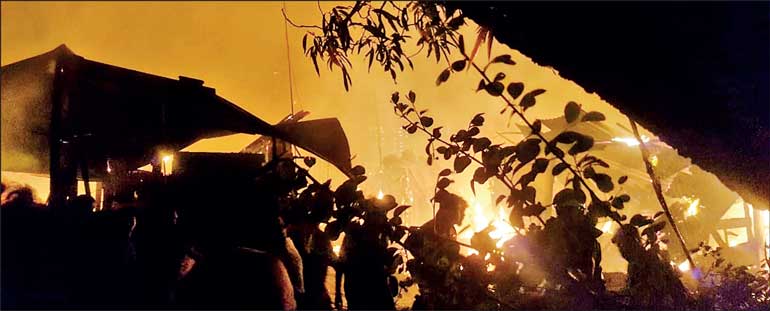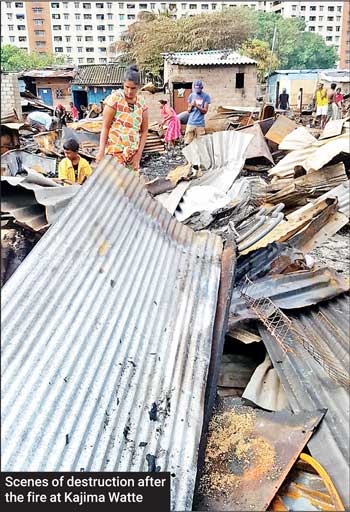Friday Feb 20, 2026
Friday Feb 20, 2026
Saturday, 13 May 2023 00:02 - - {{hitsCtrl.values.hits}}

Kajima Watte burning
 As darkness cloaks the city every night, several families sleep huddled in groups on the floor of the Prajaa Saalava, the Community Centre, hoping to avoid the regular violent disturbances they have come to expect during their time there ever since their houses burnt down to the ground, for the third time in five years. They have been on that backburner since the authorities put them there.
As darkness cloaks the city every night, several families sleep huddled in groups on the floor of the Prajaa Saalava, the Community Centre, hoping to avoid the regular violent disturbances they have come to expect during their time there ever since their houses burnt down to the ground, for the third time in five years. They have been on that backburner since the authorities put them there.
The broken windows letting the cold air and torrential rain into their sleeping places are not their worst fear. The proximity of their fellow sleepers, equally poor and unfortunate who have succumbed to drink and drugs makes it impossible to avoid getting caught up when violence breaks out, almost daily. One night recently, a particularly horrific incident put all of them except one in hospital as weapons flashed in the dead of night during a fight. A 35-year-old daily worker lost the use of his limb during this brawl, with the hospital unable to provide the plates to insert into his broken elbow, leaving him unable to work.
The daily miseries inherent in these circumstances are enacted in an environment which has those engaged in the one thriving commercial venture that ubiquitously accompanies urban poverty and marginality everywhere in the world, in Colombo’s version of “The Wire”. In these environs, the Community Centre regularly gets stones hurled at it with loud abuse from the gangs operating in the area. This sector in the hidden economy which thrives on people’s need to forget their misery, operates within areas invisibly demarcated, as competing priorities of law enforcement allow it the space to do so. In those spaces, fear and intimidation rules.
This particular enclave of the urban poor, living in uncertainty and increasing hardship within the city limits, are regular subjects of extreme domestic violence. As there is no room to have their scuffles in private, they inevitably spill over as they fall over others trying to get some sleep, who are also beaten and wounded, leaving them bleeding in the process. There’s nothing to indicate that their lives will get any better, anytime soon.
Politics and poverty
 These people are often used by politicians to fill in as their audiences at political meetings and rallies to show how well-attended they are. They go in hope that they would be granted some living space in the new flats that have come up to accommodate the urban homeless. Over the years they have been to many meetings, but the promises of houses never come to fruition for them.
These people are often used by politicians to fill in as their audiences at political meetings and rallies to show how well-attended they are. They go in hope that they would be granted some living space in the new flats that have come up to accommodate the urban homeless. Over the years they have been to many meetings, but the promises of houses never come to fruition for them.
The urban development projects in recent years saw many removed from the sides of railway tracks where they had made their homes in the city and moved to other locations while flats were being completed, supposedly for rehousing them. When those who were removed from their usual places of habitat were relocated, some fell by the wayside and remain there. Kajima Watte was one such temporary place of relocation. That location in the heart of the city is probably itself a desirable property for profitable ‘development’ and the presence of the evicted from other locations, a problem that needed to be solved. Three separate fires later, the property is vacant for the moment, but those whose houses were once there are themselves unsure how long they can stay at the Community Centre.
All of those in these temporary accommodations are day-workers. Some work as cleaners in the city streets and some clean homes in different parts of the city. Others do whatever they get on the day, selling fish, repairing phones or lifting crates in market places. Many are unemployed. Several generations of the same family occupy the place having lost their small wooden dwellings in Kajima Watte.
Children go to school from the Community Centre, studying for exams under the three lights provided by the Grama Sevaka who first herded them into this place in September last year, where he arranged a common toilet and running water for them. The Grama Sevaka can do no more for them since he has filed all information with the Urban Development Authority (UDA) which he says is now the institution that must make decisions regarding them.
When their houses were burnt for the third time, they lost everything they had carefully salvaged from previous fires and had managed to accumulate over time. Many charities and individuals came forward to provide them with food, books and shoes for the children, and help with whatever they could at that traumatic time of need. Charitable contributions can only be sustained for a period of time. Nelson Mandela is reported to have said, “Overcoming poverty is not a gesture of charity. It is an act of justice.” The traumatised survivors of the multiple fires in Colombo need other more considered solutions.
The state of the economy
According to the World Bank report released in April 2023, (Sri Lanka Development Update 2023), the 7.8% economic contraction in 2022, with the increases in the cost of living, has led national poverty to double and urban poverty to triple. The report says “half a million jobs were lost in industry and services and back-up lower paying agricultural jobs could not compensate for income losses”. Having been persuaded by Ministers to measure economic performance by the length of fuel queues, the World Bank Reports findings that the state of the economy has led to the “worst poverty levels since 2009” is an eye opener.
It is also noteworthy that the World Bank says that “the crisis left 52 percent of the population in estate areas living in poverty”. They weren’t living in peak conditions to begin with, and together with the miserable conditions of living of the urban poor, how far down will the “macroeconomic adjustments” push them, and is that of much concern to policy makers? Experts including the World Bank warn that the “necessary macroeconomic adjustments” will inevitably make things much worse before they get better, and advise there be “better targeted social assistance” to “mitigate the impact on the poor”. How will this task be approached?
The World Bank predicts that the “fluid political situation and heightened fiscal, external and financial sector imbalances pose significant uncertainty for the outlook”. The political situation is getting more fluid by the day and the day of reckoning seems not too far off as the “adjustments” are put in place. The increase in VAT from 8 to 15 percent last year may have contributed to reducing the fiscal deficit, but the burden on the poor is obvious.
Administrations which gave no thought to the consequences of undisciplined borrowings; which initiated the overnight country-wide fertiliser fiasco affecting our food security; which let the manifestly looming disaster of a burning ship loaded with oil enter our waters hoping to make some dollars out of compensation; which slyly reduced taxes for the super-rich to make even more money—they are the same ones which are advised to ‘mitigate the impact on the poor’. They are going to have to battle mightily with their natural instincts to comply with this, but they ignore this advice at their peril. It is essential that any reform program is more deeply thought out than the recent crop of decisions for reforms which their makers thought were delightfully clever at the time.
Hope against hope
In the Community Centre, people have almost lost hope. They were advised once to go back to Kajima Watte to resettle there, if they are thrown out of the Community Centre. If it happens, clashes are inevitable with the authorities. The more desperate their lives become, the lack of alternatives generally leads to crime and addiction which will not be without consequence for the entire city. It has been said that poverty is the worst form of violence. These people are only one urban representation of hundreds of thousands of others who have been povertised throughout the country.
The older of the displaced remember a time when an indefatigable President cared enough about them to start an ambitious housing project for the marginalised urban homeless. They say that during his time, they would not have been left in this state. They don’t hold out much hope now for such a time again. A different category of unresolved issues of vital significance, finally bred the suicide bomber who killed that President.
In 2016, when the backhoe machines razed their houses to the ground, this community rioted by occupying the Kelani Bridge, burning cars and tyres as mayhem ensued. They were soon resettled. Now, they are the unseen, the marginal, the quietly helpless. As the macroeconomic adjustments are planned and executed, the social safety nets should surely not pass them by.